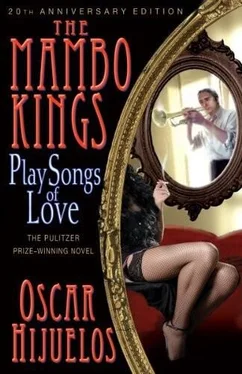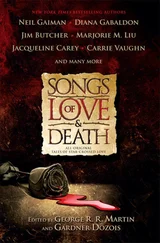As I shook my uncle, he opened his eyes and gave me his hand, hard and callused from his other job in those days, as superintendent, and he said, “Eugenio, help me. Help me.”
I tugged with all my strength, but it was hopeless. Still he tried: with great effort he made it to one knee, and then, with his hand braced on the floor, he started to push himself up again. As I gave him another tug, he began miraculously to rise. Then he pushed my hand away and said, “I’ll be okay, kid.”
With one hand on the table and the other on the steam pipe, he pulled himself to his feet. For a moment he towered over me, wobbling as if powerful winds were rushing through the apartment. Happily I led him down the hallway and into the living room, but he fell over again by the door — not fell over, but rushed forward as if the floor had abruptly tilted, as if he had been shot out of a cannon, and, wham, he hit the bookcase in the hall. He kept piles of records there, among them a number of the black and brittle 78s he had recorded with my father and their group, the Mambo Kings. These came crashing down, the bookcase’s glass doors jerking open, the records shooting out and spinning like flying saucers in the movies and splintering into pieces. Then the bookcase followed, slamming into the floor beside him: the songs “Bésame Mucho," “Acércate Más,” “Juventud,” “Twilight in Havana,” “Mambo Nine,” “Mambo Number Eight,” “Mambo for a Hot Night,” and their fine version of “Beautiful María of My Soul”—all these were smashed up. This crash had a sobering effect on my uncle. Suddenly he got to one knee by himself, and then the other, stood, leaned against the wall, and shook his head.
“Bueno, ” he said.
He followed me into the living room, and plopped down on the couch behind me. I sat on a big stuffed chair that we’d hauled up out of the basement. He squinted at the screen, watching himself and his younger brother, whom, despite their troubles, he loved very much. He seemed to be dreaming.
“Well, folks,” Ricky Ricardo said, “and now I have a real treat for you…”
The two musicians in white silk suits and big butterfly-looking lace bow ties, marching toward the microphone, my uncle holding a guitar, my father a trumpet.
“Thank you, thank you. And now a little number that we composed…” And as Cesar started to strum the guitar and my father lifted his trumpet to his lips, playing the opening of “Beautiful María of My Soul,” a lovely, soaring melody line filling the room.
They were singing the song as it had been written — in Spanish. With the Ricky Ricardo Orchestra behind them, they came into a turnaround and began harmonizing a line that translates roughly into English as: “What delicious pain love has brought to me in the form of a woman.”
My father… He looked so alive!
“Uncle!”
Uncle Cesar had lit a cigarette and fallen asleep. His cigarette had slid out of his fingers and was now burning into the starched cuff of his white shirt. I put the cigarette out, and then my uncle, opening his eyes again, smiled. “Eugenio, do me a favor. Get me a drink.”
“But, Uncle, don’t you want to watch the show?”
He tried really hard to pay attention, to focus on it.
“Look, it’s you and Poppy.”
“ Coño, sí …”
My father’s face with his horsey grin, arching eyebrows, big fleshy ears — a family trait — that slight look of pain, his quivering vocal cords, how beautiful it all seemed to me then…
And so I rushed into the kitchen and came back with a glass of rye whiskey, charging as fast as I could without spilling it. Ricky had joined the brothers onstage. He was definitely pleased with their performance and showed it because as the last note sounded he whipped up his hand and shouted “ Olé! ” a big lock of his thick black hair falling over his brows. Then they bowed and the audience applauded.
The show continued on its course. A few gags followed: a costumed bull with flowers wrapped around its horns came out dancing an Irish jig, its horn poking into Ricky’s bottom and so exasperating him that his eyes bugged out, he slapped his forehead and started speaking a-thousand-words-a-second Spanish. But at that point it made no difference to me, the miracle had passed, the resurrection of a man, Our Lord’s promise which I then believed, with its release from pain, release from the troubles of this world.
SİDE A: In the Hotel Splendour 1980

NEARLY TWENTY-FIVE YEARS after he and his brother had appeared on the I Love Lucy show, Cesar Castillo suffered in the terrible heat of a summer’s night and poured himself another drink. He was in a room in the Hotel Splendour on 125th Street and Lenox Avenue, not far from the narrow stairway that led up to the recording studios of Orchestra Records, where his group, the Mambo Kings, made their fifteen black brittle 78s. In fact, it could have been the very room in which he had once bedded down a luscious and long-legged party girl by the name of Vanna Vane, Miss Mambo for the month of June 1954. Everything was different then: 125th Street was jumping with clubs, there was less violence, there were fewer beggars, more mutual respect between people; he could take a late-night stroll from the apartment on La Salle Street, head down Broadway, cut east on 110th Street to Central Park, and then walk along its twisting paths and across the little bridges over streams and rocks, enjoying the scent of the woods and nature’s beauty without a worry. He’d make his way to the Park Palace Ballroom on East 110th Street to hear Machito or Tito Puente, find musician friends at the bar, chase women, dance. Back then, you could walk through that park wearing your best clothes and a nice expensive watch without someone coming up behind you and pressing a knife against your neck. Man, those days were gone forever.
He laughed: he would have given anything to have the physical virtuosity now that he did when he was thirty-six and first brought Miss Mambo up those stairs and into the room. He used to live for that moment when he could strip a woman down on a bed: Miss Vanna Vane of Brooklyn, New York, had a mole just below the nipple of her right breast, and, boom, his big thing used to stick out just like that, just by touching a woman’s breast or standing close to her and sensing the heat between her legs. Women wore nicer clothes back then, more elaborate delicate things, and it was more fun to watch them undress. Yes, perhaps that was the room where he’d take Vanna Vane on those glorious unending nights of love so long ago.
He sat in the flickering street-lit window, his languorous heavy-jowled hound’s face glowing like white stone. He’d brought up a little phonograph, used to belong to his nephew Eugenio, and a package of old records made by his group, the Mambo Kings, in the early 1950s. A case of whiskey, a carton of cigarettes — filtered Chesterfields (“Folks, smoke Chesterfields, the preferred tobacco, the Mambo King’s favorite!”) that had wrecked his nice baritone voice over the years; and a few other items: paper, envelopes, a few BiC pens, his tattered address book, stomach pills, a dirty magazine — something called El Mundo Sexual— a few faded photographs, a change of clothes, all packed in a beaten-up cane suitcase. He was planning to stay in the Hotel Splendour for as long as it would take him to drink that whiskey (or until the veins on his legs burst), figuring he’d eat, if he had to, at the Chinese place on the corner with its sign saying, “Takee Out Only.”
Читать дальше













